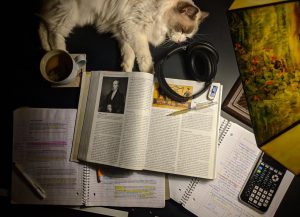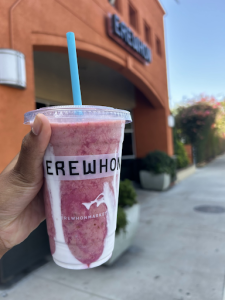Dear relatives, I am not your stereotype
Sophomore Ridhima Kodali discusses about how she is aware of her culture.
April 14, 2021
Dear relatives,
I am not an American Born Confused Desi.
Around the age of nine or ten, I was in Hyderabad, India in a room with y’all and I have sometimes felt like an outcast. After all, I wasn’t born and raised there.
I looked at one girl who grandma was tutoring. She wore two braids with two navy bows tightly clipped on each side and a swift and even middle part. She was wearing a long white shirt with navy pants underneath.
I just felt the comparison about to spark and light up. Because I wasn’t like her at all. I wouldn’t study all day, wear braids every single day or I don’t even take extra help or tutoring.
Looking at her, I felt more of an outcast than ever — because I wasn’t like her or the rest of the teenagers in India. I wasn’t fluent in Telugu, as much as she was, or very polite and humble. Nor would I wear Indian clothing throughout the day.
I’m not quiet. I speak up when I want to. I am tired of being someone who I am not: the goody-two-shoes granddaughter. I am tired of being stuck in the mirror and not coming out of my reflection around you guys. I am tired of trying to be the perfect granddaughter who does household chores, has your own set of “Sanskari” or values. I want to voice my opinions and I won’t just stand by and listen.
Being constantly being compared to the girl is when “ABCD” swooped right in.
This acronym has flooded into each layer of my mind, filling me with doubt about it. I’ve heard it multiple times before — seen it used in films and people have said it to me multiple times. I knew what it stood for, but I never understood its meaning.
American Born Confused Desi?
Soon after, I realized it’s the point of contention: to tell us, first-generation Indian-Americans we aren’t “Indian enough.” People do not get how offensive and derogatory it is, to use “ABCD.” Especially, in this context.
Forgetting roots and culture is a perceived notion, many of you, relatives have.
You guys think I would wear certain clothes or act a certain way because I was from America or from a tv show. It angers me so much I feel like I am about to burst within a second when you bring it up.
They would let me believe I was an American Born Confused Desi
I admit I don’t wear a bindi or a Kurti every day, but does that affect how I view my culture and my identity? Does it show that I’m ‘confused’ about my culture –no, not at all. It’s like we have to be confused and we have to question ourselves and our religion, because of all these relatives telling us what to do and how we should be. Also, it’s like we have to encapsulate that term into our whole personality.
How can you perceive that I “forgot my roots” or “forgot my culture or do not know my identity?”
“ABCD” has been stereotyped into Indian-Americans. We are forced to act a certain way, follow certain rules or even wear certain clothes. But, we don’t have to. I don’t have to. Let me remind you, curiosity and confusion are two completely different things, which many Indians including you guys, fail to realize.
So, next time when you say something like, “of course since you are from America you do this” keep in mind, I am not confused. I know why we do certain things every day (or most days), like pray. Or why we celebrate certain festivals or why we do rituals. But, before you go, I want to leave you with one thing. I want you to know this:
I am not an American Born Confused Desi.
I am an American Born Desi.













